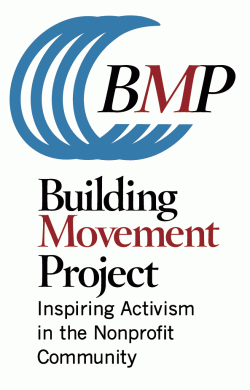Apr
5
2013

Written by Sean Thomas-Breitfeld
Posted by Sean Thomas-Breitfeld, Co-Director
Here at Building Movement, we often talk about the importance of devoting time for learning as the first step in the Transformation process of integrating social change values and activities into the work of service agencies. Our staff and project team are always trying to address tough questions facing the nonprofit sector. That thirst for learning and knowledge often leads us to look for what is being written in the academy. Sometimes the research of professors is insightful, sometimes it’s impenetrable, but it always sparks interesting conversation. For our upcoming meeting of the staff and project team, we are reading these two articles:
• “Nonprofit Human-Service Organizations, Social Rights, and Advocacy in a Neoliberal Welfare State” by Yeheskel Hasenfeld and Eve E. Garrow, June 2012
• “The Marketization of the Nonprofit Sector: Civil Society at Risk?” by Angela M. Eikenberry and Jodie Drapal Kluver, March/April 2004
The “Neoliberal” article reviews the history of human-service associations and their role as advocates for social rights. It then describes how that advocacy role has been reshaped by bigger shifts in our economy and politics. The authors say that the bigger economic forces – like growing economic inequality and deeper poverty – make the historic, advocate role that nonprofits played more important than ever; but those same economic forces prevent political activity by our sector.
The “Marketization” article looks at how nonprofits have adopted ‘market-based approaches’ like fee-for-service and social entrepreneurship in response to the rise of venture philanthropy and competition for government contracts. The authors claim that this shift towards a market orientation is taking place at the expense of the role nonprofits could play in creating and maintaining civil society by serving as laboratories of democratic citizenship, building bonds of trust and reciprocity, and also advocating for policies that serve the long-term public interest (rather than organizational bottom-lines).
Both articles are pretty weighty and pose some tough critiques. But they are incredibly interesting and raised a lot of questions for me. There are two particular topics that I’m looking forward to exploring with the Building Movement Project Team:
1. The articles focused on how market-based thinking was pushed on the sector, but were there other reasons that nonprofits looked to the market for new models and innovation? Is there anything to learn and integrate from the market or does it always lead to compromises in mission?
2. The challenges around funding that were described in the articles are real, but how widespread are the changes in the practices of nonprofits? Are organizations really “weeding out” and “creaming” to show results, stay competitive and provide a return on investment? How can we use the concepts of civil society to shift funders’ understanding of metrics and impact?
After our meeting, I will post an update on how the discussion about these articles goes, and what we learn from it all. So check back at the end of the month, and if you have any reactions to these articles or questions I’m posing, email me at [email protected]!
